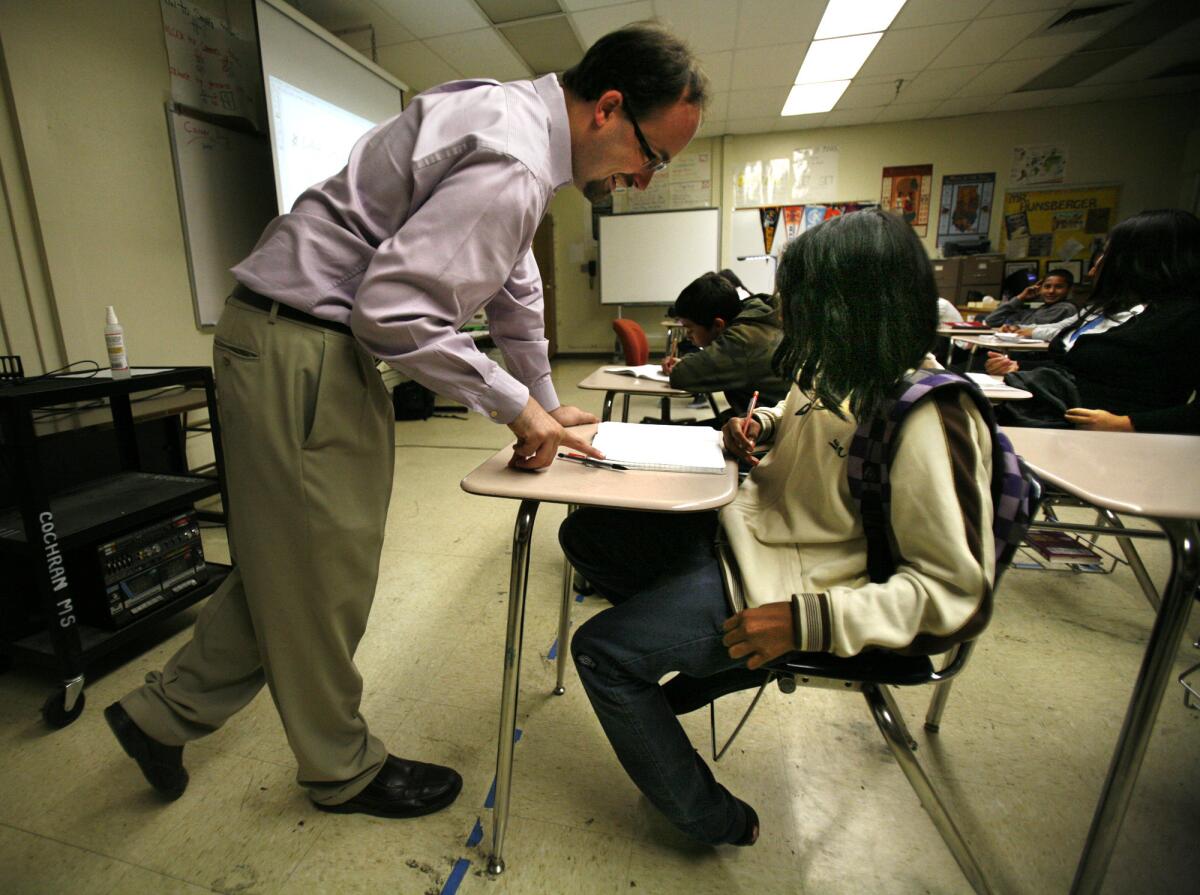Major districts ignore student performance in teacher evaluations, study finds

- Share via
Major California school districts are failing to comply with a state law that requires them to evaluate teachers in part by how much their students have learned, according to a study released Wednesday.
The review of 26 school districts representing more than 1.2 million students found that only Clovis Unified near Fresno and Sweetwater Union High in San Diego County fully complied with the law. Two others, Upland Unified in the Inland Empire and San Ramon Valley in Contra Costa County, were “blatantly in violation” of the law by expressly prohibiting the use of state standardized test scores in their teacher evaluations, the study said. The findings were disputed by both districts.
The other school systems surveyed, which included Long Beach, San Diego, Oakland and San Francisco, offered mixed findings, according to the study conducted by the EdVoice Institute for Research and Education, a Sacramento-based educational advocacy organization.
“Unfortunately, too many school districts are choosing to ignore whether every child under their supervision has been assigned to a truly effective teacher,” said Bill Lucia, EdVoice president.
Los Angeles Unified was not included in the study, Lucia said, because it is in the process of revamping an evaluation system to include evidence of student academic achievement, as ordered to do so in 2012 by a Los Angeles County Superior Court judge.
It was Lucia’s group that pushed forward the issue with a 2011 lawsuit against L.A. Unified, asserting that the district was failing to include in their teacher and administrator evaluations measures of how much they helped students learn what the state and district expect them to know. As a result, too many students had teachers whose effectiveness could not be accurately gauged, the lawsuit said.
Los Angeles County Superior Court Judge James C. Chalfant agreed with the plaintiffs and ordered the district to use California standardized test scores in determining student achievement. But he gave L.A. Unified wide discretion in deciding which yardsticks to use to judge progress in learning its local academic standards.
As L.A. Unified works through “growing pains” to revamp its evaluation process, Lucia said, his group sought to gauge conditions in other California school districts. The group reviewed collective bargaining agreements, evaluation forms, district handbooks, memos and nearly 100 other documents.
Eight of the districts also provided copies of final evaluations with names of teachers redacted. Among nearly 2,000 evaluations reviewed, 98% of teachers were deemed satisfactory.
The study found that 11 districts included student learning progress in their evaluations, including Long Beach, San Diego, Garden Grove, Riverside and Oakland. The rest, including San Jose, San Francisco, Sacramento and San Bernardino, showed no evidence of doing so.
In Upland and San Ramon Valley, collective bargaining agreements with teachers prohibit the use of state standardized test results in performance reviews -- a practice Lucia called illegal.
But Upland Unified Supt. Nancy Kelly said in an email that teacher evaluations are based on state professional standards for teachers and “therefore adhere to the evaluation and assessment guidelines required by the Stull Act.”
In San Ramon Valley, spokeswoman Elizabeth Graswich acknowledged that state standardized test scores are not used but said other measures of student learning are included. The district plans to launch a limited test of a new evaluation system next year with a more specific emphasis on student academic progress, she said.
Lucia urged state officials to monitor district compliance with the law in assessing funding levels and called on families to insist on evaluations that consider how effectively teachers help their children learn.
“It’s undeniable that California’s future standard of living and competitiveness will depend directly on how well our public schools serve every student, regardless of heritage and income,” Lucia said. “Every child deserves a great teacher.”
Twitter: @TeresaWatanabe
More to Read
Sign up for Essential California
The most important California stories and recommendations in your inbox every morning.
You may occasionally receive promotional content from the Los Angeles Times.














